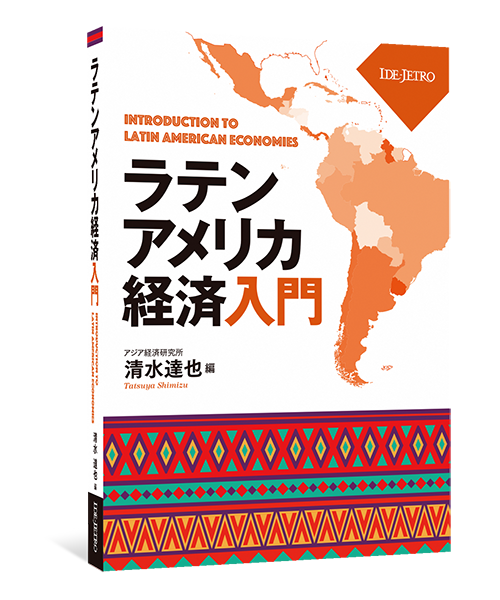Japanese eBooks
eBook

Introduction to Latin American Economies
Authors/Editors
Tatsuya Shimizu
Publication date
January 2024
ISBN
978-4-258-04659-1
Download eBook for free
Available in EPUB and PDF format for full book. EPUB files can be opened in eBook readers.
About this book
About this book
This textbook is aimed at Japanese university students interested in learning about Latin American countries and their economies.
The book has three features. First, it updates the contents of earlier Japanese textbooks on Latin American economies, including recent regional economic trends such as the commodity boom from the 2000s to 2010s. The book also explains new findings in development economics, such as the institutional perspective on economic development. Second, the book is intended to attract the attention of students by focusing on current issues in Latin America rather than on historical perspectives. Third, the book utilizes new media and technology. The book was published as an open-access e-book on the website of the Institute of Developing Economies. Anyone wishing to learn about Latin American economies in Japanese can read it free of charge.
Contents
Preface
Part I Contemporary Issues
Chapter 1 Introduction: What Is Latin America?
Author:Hiroyuki Tani
Chapter 2 Poverty and Inequality: Are People’s Lives Improving?
Author:Yoshiaki Hisamatsu
Chapter 3 Health and Education: Can Governments Provide Good-quality Health Care and Education?
Author:Yoshiaki Hisamatsu
Chapter 4 Informality: Why Does the Informal Economy Persist?
Author:Nobuaki Hamaguchi
Chapter 5 Migration: Why Do People Move across Borders?
Author:Hiroyuki Tani
Chapter 6 Development and Environment: Why Are There Conflicts between Natural Resource Development and Environmental Conservation?
Author:Tatsuya Shimizu
Chapter 7 International Development: Which Actors Are Solving Social Problems?
Author:Yoshiaki Hisamatsu
Part II Mechanisms of the Economy
Chapter 8 International Trade: Trade Can Bring Benefits and Inequality
Author:Nobuaki Hamaguchi
Chapter 9 Primary Exports: The Role of Primary Exports in Economic Development
Author:Tatsuya Shimizu
Chapter 10 Industrialization: Aiming for Economic Development through Industrialization
Author:Tatsuya Shimizu
Chapter 11 Economic Development: The Difference between Growing and Stagnant Countries
Author:Koichi Kitano
Chapter 12 External Debt: Lessons from the Lost Decade
Author:Koichi Kitano
Chapter 13 Inflation: Doubling Prices in a Month
Author:Koichi Kitano
Part III Economic History
Chapter 14 Economic History: What Is Economic Development?
Author:Hiroyuki Tani
Chapter 15 Neoliberalism: The Debate over Individual Freedom and the Role of the State
Author:Nobuaki Hamaguchi
Glossary
Preface
Preface
This textbook is aimed at Japanese university students interested in learning about Latin American countries and their economies.
The book has three features. First, it updates the contents of earlier Japanese textbooks on Latin American economies, including recent regional economic trends such as the commodity boom from the 2000s to 2010s. The book also explains new findings in development economics, such as the institutional perspective on economic development. Second, the book is intended to attract the attention of students by focusing on current issues in Latin America rather than on historical perspectives. Third, the book utilizes new media and technology. The book was published as an open-access e-book on the website of the Institute of Developing Economies. Anyone wishing to learn about Latin American economies in Japanese can read it free of charge.
This publication is the product of a research project entitled “Preparing a textbook and teaching materials for contemporary economies in Latin America” (Organizer: Tatsuya Shimizu), funded by the Institute of Developing Economies (IDE) in FY2021-2022. The authors presented drafts at the annual congress of the Japan Society of Social Science on Latin America in November 2021 and 2022. We appreciate the comments received from Profs. Kojiro Takeshita (Takushoku University), Kaoko Sakikawa (Aoyama Gakuin University), Yoshimichi Murakami (Kobe University), and Yoshitada Fujii (Setsunan University) as well as other congress participants. In addition, I would like to express my deepest gratitude to Shiori Tani, who prepared the beautiful maps in Chapter One, and to Kenji Ikegami at the Academic Information Center, IDE-JETRO, who provided editorial support.
December 2023
Tatsuya Shimizu, editor


